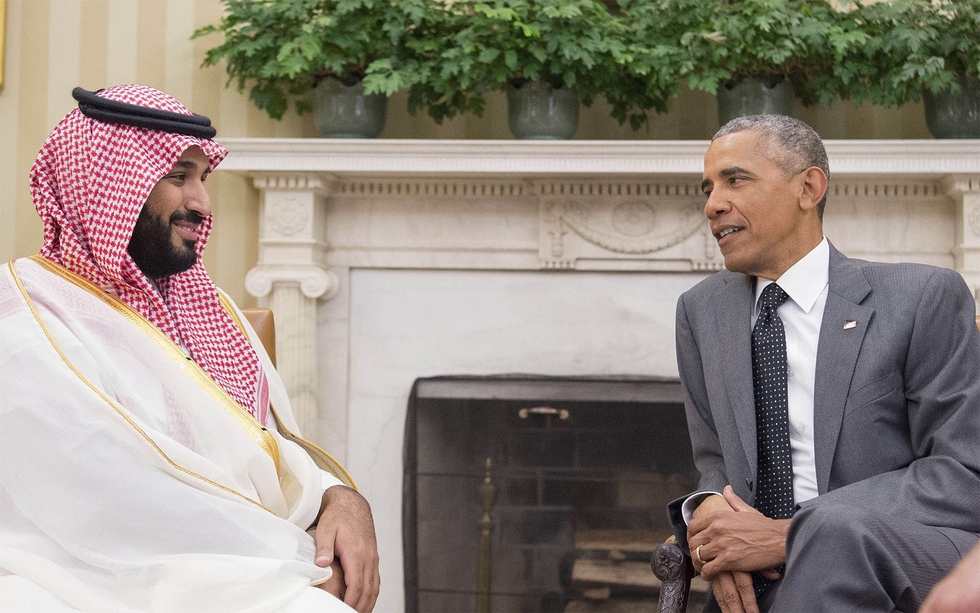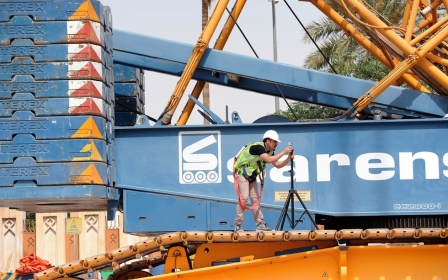Obama meets influential young Saudi prince to improve relations

US President Barack Obama hosted youthful Saudi Arabian Prince Mohammed bin Salman at the White House on Friday, underscoring his guest's meteoric rise and increasingly pivotal role in managing strained US-Saudi ties.
The 30-year-old deputy crown prince, who has become the driving force behind economic reform and a more activist Saudi foreign policy, swept into the West Wing with a gaggle of advisers for hour-long talks.
Bin Salman, the king's son and the country's defence minister, has met the biggest of Washington's big hitters during a week-long visit.
He held talks with the CIA director, the secretaries of state, defense, treasury, commerce and energy as well as leading members of Congress.
His meeting with Obama took place in the Oval Office, a rare honor for a non-head of state, one not afforded to the Dalai Lama earlier in the week.
"The meetings were very, very positive. I believe there was a commonality in terms of visions and views," said Saudi Foreign Minister Adel al-Jubeir.
Experts and security officials have expressed fears that Saudi Arabia may face collapse if bin Salman fails with his policies and reforms.
"It's him or it's ISIS," an anonymous Saudi expert told NBC news.
"[Bin Salman] has to win," said a US intelligence source. "It's that simple."
US officials and experts believe that bin Salman is primed to become the next king, despite technically being ranked in succession behind his cousin, Crown Prince Mohammed bin Nayef, who is “seriously ill,” said Bruce Riedel, a former intelligence officer for the Middle East.
"He is notionally number three in the hierarchy, but effectively he's number one," said Simon Henderson of the Washington Institute, a think-tank focused on the Middle East.
"The king prefers his son and wants his son to be king," Henderson said.
"We've put a lot of markers down on Mohammed bin Nayef. It's the smart move to do the same with bin Salman. It's an opportunity to get to know him," Riedel said.
For the White House, bin Salman is a relative unknown, while bin Nayef has been the go-to royal on counterterrorism for years.
Gregory Gause of Texas A&M University said bin Salman's visit was "an effort by him to be recognised."
The meeting came amid strained ties between the US and Saudi Arabia over Iran, war in Yemen and the seemingly imminent release of a US dossier about alleged Saudi Arabian links to the 11 September 2001 attacks.
However, Riedel told NBC news that several officials are concerned about his bin Salman's “recklessness”.
As minister of defence, bin Salman got his country into expensive wars, including intervention in Yemen that reportedly cost the kingdom up to $200m per day until a ceasefire took effect.
He’s also the country’s economic czar, and is seen as a chief architect in the strategy to pump oil as a way to crash oil prices, which has caused cuts in the country’s social services, including subsidies for Saudi citizens.
While in power, Saudi’s relations with Iran have worsened, and bin Salman reportedly approved the execution of influential Shia cleric Nimr al-Nimr.
Amid disagreement over the US nuclear deal with Iran, economic reform appears to be a much-needed issue that could bring Riyadh and Washington together.
High on the agenda was bin Salman's effort to overhaul Saudi Arabia's state-dominated and oil-dependent economy, bringing in the private sector and creating jobs for the country's youthful population.
"Given their huge investment in education over the last decade, if they are not able to move away from a state-run economy and develop a private sector, you are not going to have the jobs that young people need," said former US ambassador to Saudi Arabia James Smith.
Amid disagreement over the US nuclear deal with Iran, economic reform appears to be a much-needed issue that could bring Riyadh and Washington together.
The longstanding US-Saudi relationship, built on an exchange of American security backing for a reliable supply of Saudi oil, has become strained as the US has gained greater energy independence while reaching a historic agreement with the Saudis' bitter foe in the region, Iran.
Obama's White House has repeatedly argued that Saudi Arabia's most pressing security task is internal reform to put the autocratic state on a more stable and sustainable footing.
During the Oval Office meeting, "the president commended the deputy crown prince's commitment to reforming Saudi Arabia's economy," according to the White House.
The meeting also addressed another of bin Salman's signature policies - Saudi Arabia's war in Yemen, which has been a point of contention between the White House and the royal court.
The US has aided and publically backed the operation to push back against Iranian-backed Houthi rebels who took over the capital, Sanaa.
The war signalled Saudi Arabia's willingness to tackle Iranian influence in the region, but Obama's administration has been repeatedly embarrassed by the killing of civilians and concerned that while the war has dragged on al-Qaeda has been allowed to grow.
More than 6,400 Yemenis have been killed since the intervention started 15 months ago, the majority of them civilians.
There are signs that the war may be winding down and Saudi Arabia and its allies may be shifting focus to tackling al-Qaeda, even though the Houthis remain in control of most of the central and northern highlands as well as the Red Sea coast.
The United Arab Emirates on Wednesday announced its "war is over" in Yemen, although it left open the possibility of a continued counterterrorism role.
"The president welcomed Saudi Arabia's commitment to concluding a political settlement of the conflict," the White House said.
Middle East Eye propose une couverture et une analyse indépendantes et incomparables du Moyen-Orient, de l’Afrique du Nord et d’autres régions du monde. Pour en savoir plus sur la reprise de ce contenu et les frais qui s’appliquent, veuillez remplir ce formulaire [en anglais]. Pour en savoir plus sur MEE, cliquez ici [en anglais].




